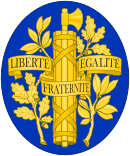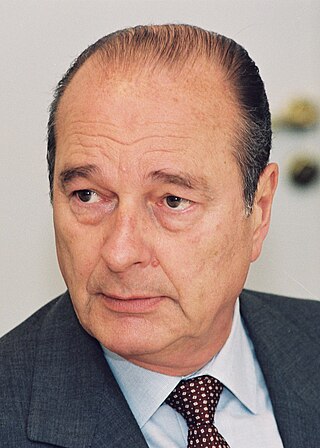
Jacques René Chirac was a French politician who served as President of France from 1995 to 2007. He was previously Prime Minister of France from 1974 to 1976 and 1986 to 1988, as well as Mayor of Paris from 1977 to 1995.
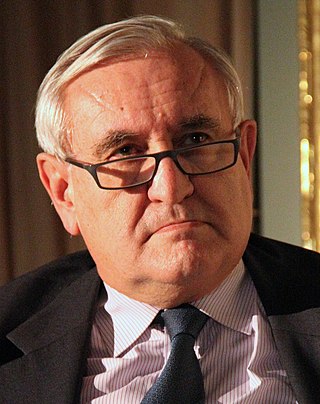
Jean-Pierre Raffarin is a French politician who served as Prime Minister of France from 6 May 2002 to 31 May 2005.

The Rally for the Republic was a Gaullist and conservative political party in France. Originating from the Union of Democrats for the Republic (UDR), it was founded by Jacques Chirac in 1976 and presented itself as the heir of Gaullist politics. On 21 September 2002, the RPR was merged into the Union for the Presidential Majority, later renamed the Union for a Popular Movement (UMP).

The Union for French Democracy was a centre-right political party in France. The UDF was founded in 1978 as an electoral alliance to support President Valéry Giscard d'Estaing in order to counterbalance the Gaullist preponderance over the political right in France. This name was chosen due to the title of Giscard d'Estaing's 1976 book, Démocratie française.
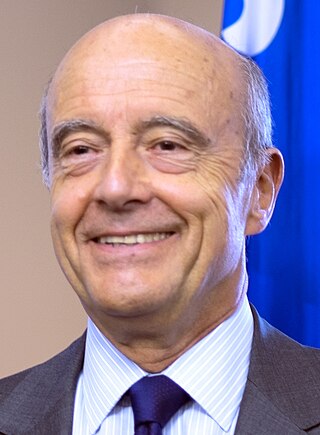
Alain Marie Juppé is a French politician. A member of The Republicans, he was Prime Minister of France from 1995 to 1997 under President Jacques Chirac, during which period he faced major strikes that paralysed the country and became very unpopular. He left office after the victory of the left in the snap 1997 legislative elections. He had previously served as Minister of Foreign Affairs from 1993 to 1995, and as Minister of the Budget and Spokesman for the Government from 1986 to 1988. He was president of the political party Union for a Popular Movement (UMP) from 2002 to 2004 and mayor of Bordeaux from 1995 to 2004.

Presidential elections were held in France on 23 April, with a second round on 7 May.
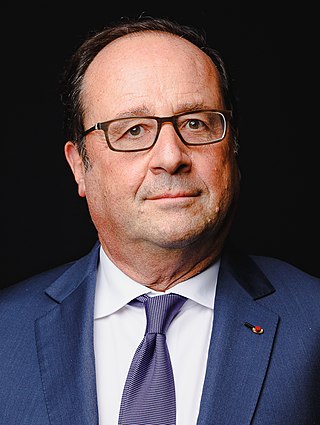
Regional elections in were held in France on 21 and 28 March 2004. At stake were the presidencies of each of France's 26 regions which, although they do not have legislative powers, manage sizeable budgets. The results were a triumph for the parties of the left, led by the French Socialist Party (PS) in alliance with minor parties, including the French Communist Party (PCF), the Left Radical Party (PRG) and The Greens. The left has usually fared moderately well in regional elections, but this was their best result since the regional system was introduced.
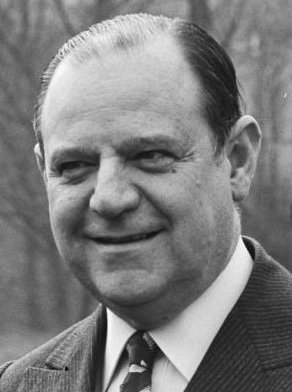
Raymond Octave Joseph Barre was a French right-wing politician and economist. He was a Vice President of the European Commission and Commissioner for Economic and Financial Affairs under three presidents. He later served as Prime Minister under Valéry Giscard d'Estaing from 1976 until 1981. As a candidate for the presidency in 1988, he came in third and was eliminated in the first round. He was born in Saint-Denis, on the French island of Réunion, and then still a colony.

Philippe Douste-Blazy is a French United Nations official and former centre-right politician. Over the course of his career, he served as Under-Secretary-General of the United Nations, Special Adviser on Innovative Financing for Development in the UN and chairman of UNITAID.

Renaud Donnedieu de Vabres, often known as RDDV, is a French politician, France's Minister of Culture from 2004 to 2007. He is a member of the UMP center-right party, and the grandson of Henri Donnedieu de Vabres.
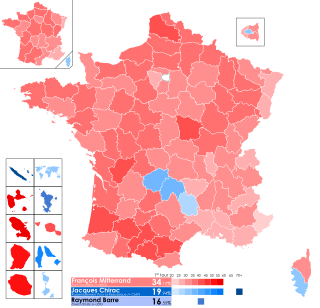
Presidential elections were held in France on 24 April and 8 May 1988.

The Republican Party was a liberal conservative political party in France founded in 1977. It replaced the National Federation of the Independent Republicans that was founded in 1966. It was created by the then-President of France, Valéry Giscard d'Estaing. It was known to be conservative in domestic, social and economic policies, pro-NATO, and pro-European.

Legislative elections were held in France on 16 March 1986 to elect the eighth National Assembly of the Fifth Republic. Contrary to other legislative elections of the Fifth Republic, the electoral system used was that of party-list proportional representation.

Legislative elections were held in France on 12 and 19 March 1978 to elect the sixth National Assembly of the Fifth Republic.

Michel Poniatowski was a French politician, member of a legitimized line of Poland's princely Poniatowski family. He was a founder of the Independent Republicans and a part of the administration for President Valéry Giscard d'Estaing. Poniatowski served as Minister of Health from 1973 to 1974 and Minister of the Interior in the Giscard d'Estaing government from 1974 to 1977. He was a founder and honorary president of the Union for French Democracy.

Charles Marie Philippe Millon is a French politician who served as Minister of Defence from 1995 to 1997 under Prime Minister Alain Juppé. A former member of the Union for French Democracy (UDF), he represented Ain in the National Assembly, where he took the presidency of the UDF group over from Jean-Claude Gaudin from 1989 until 1995. Millon also held the mayorship of his native town of Belley from 1977 to 2001 and presidency of the Regional Council of Rhône-Alpes from 1988 to 1999.
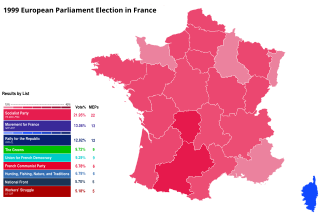
European Parliament elections were held in France on 13 June 1999. Once again, abstention was very high for this type of election- only 47% of eligible voters voted. The election was also the first French European election to be won by the Socialist Party (PS).
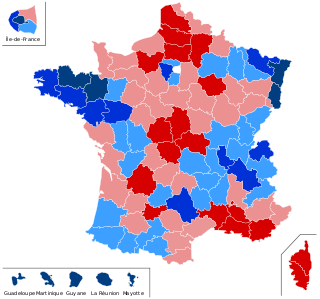
A referendum on the Maastricht Treaty for the founding of the European Union was held in France on 20 September 1992. It was approved by 51% of the voters. The result of the referendum, known as the "petit oui", along with the Danish "No" vote (50,7%) are considered to be signals of a transition into another stadium of European integration, away from the "permissive consensus" which had existed in most memberstates until then. From this point forward issues relating to European integration were subject to more intensive discussions across much of Europe, and later overt euroscepticism gained prominence. Only France, Ireland and Denmark held referendums on the Maastricht Treaty ratification.

The 4th constituency of Ille-et-Vilaine is a French legislative constituency in the Ille-et-Vilaine département. Like the other 576 French constituencies, it elects one MP using the two-round system, with a run-off if no candidate receives over 50% of the vote in the first round.

The 2004 Union for a Popular Movement leadership election was held on November 28, 2004 to elect the leadership of the French Union for a Popular Movement. The congress was organized after the UMP's first president, Alain Juppé, was forced to resign from the party's presidency following his conviction in a corruption scandal.
